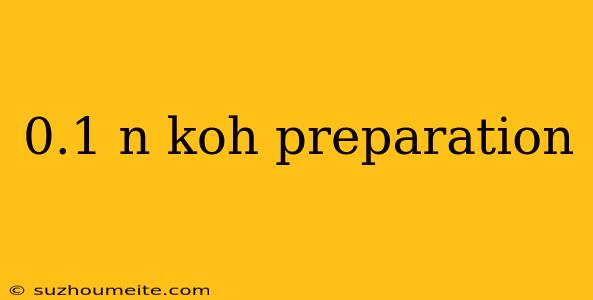0.1 N KOH Preparation: A Comprehensive Guide
Introduction
0.1 N KOH (Potassium Hydroxide) solution is a commonly used reagent in various laboratory applications, including analytical chemistry, biochemistry, and molecular biology. In this article, we will provide a step-by-step guide on how to prepare a 0.1 N KOH solution.
Materials Needed
- Potassium Hydroxide (KOH) pellets
- Distilled water
- A 100 mL volumetric flask
- A weighing balance
- A glass stirring rod
Preparation of 0.1 N KOH Solution
Step 1: Calculating the Amount of KOH
Calculate the amount of KOH required to prepare 100 mL of 0.1 N KOH solution.
The molecular weight of KOH is 56.11 g/mol. To prepare 0.1 N KOH, we need 0.1 equivalents of KOH per liter, which is equivalent to 5.611 g/L.
For 100 mL, we need:
5.611 g/L x 0.1 L = 0.5611 g
Step 2: Weighing the KOH
Weigh out 0.5611 g of KOH pellets using a weighing balance.
Step 3: Transferring the KOH to the Volumetric Flask
Transfer the weighed KOH pellets to a 100 mL volumetric flask.
Step 4: Adding Distilled Water
Add a small amount of distilled water to the flask to dissolve the KOH pellets. Use a glass stirring rod to mix until the pellets are fully dissolved.
Step 5: Diluting to Volume
Add more distilled water to the flask to reach a final volume of 100 mL. Mix well to ensure the solution is homogeneous.
Step 6: Verifying the Concentration
Verify the concentration of the KOH solution using a pH meter or by titrating with a strong acid, such as hydrochloric acid.
Tips and Precautions
- Always wear protective gloves, goggles, and a lab coat when handling KOH, as it is a strong base that can cause skin and eye irritation.
- Use a fume hood to avoid inhaling the dust of KOH pellets.
- Handle the KOH solution with care, as it can be corrosive and cause damage to skin and surfaces.
- Store the 0.1 N KOH solution in a tightly closed container, away from light and heat.
By following these steps and taking the necessary precautions, you can successfully prepare a 0.1 N KOH solution for your laboratory applications.
